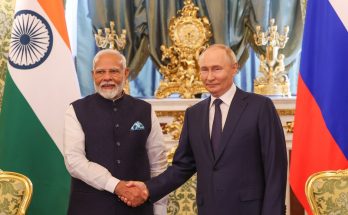
In the Cornish seaside resort of Carbis Bay in UK, the leaders of the G7 grouping of the world’s wealthiest democracies are meeting to script a new narrative of a reinvigorated West amid a festering pandemic and radical uncertainties about the shape of the post-Covid world order. The most awaited outcome from the summit will be a G7 pledge to donate 1 billion COVID-19 vaccine doses to poorer countries with the overarching goal of inoculating the world by the end of next year.
In an attempt to widen the influence of the grouping, the UK, the G7 host for 2021, has invited the leaders of India, South Korea, Australia, South Africa and Brunei (as the head of ASEAN) for the Cornwall summit. In view of the deadly second wave of the pandemic in India, Prime Minister Modi will not be in Cornwall, but will participate in the G7 summit virtually on July 12-13. This is the second time PM Modi will participate in a G7 meeting. India was invited by France in its capacity as G7 presidency to the Biarritz summit in 2019 as a ‘Goodwill Partner’ and he participated in the sessions on ‘Climate, Biodiversity and Oceans’ and ‘Digital Transformation’.

The Group of Seven (G7) comprises the UK, Canada, France, Germany, Italy, Japan and the US. The G7 summit, themed ‘Build Back Better,’ will pivot around four priorities outlined by the UK its presidency. These four areas include global recovery from coronavirus while strengthening resilience against future pandemics; promoting future prosperity by championing free and fair trade; tackling climate change and preserving the planet’s biodiversity; and championing shared values and open societies. India has vital stakes in each of these four focus areas. In his speech at the G7 outreach meeting, PM Modi will exhort the seven powerful democracies to commit funds and expertise for vaccinating people in developing countries.
PM Modi will join South African President Cyril Ramaphosa to pitch for G7 support for their joint proposal for temporary waiver of patents and other intellectual property rights (IPRs) in WTO for Covid-19 drugs, vaccines, diagnostics and other technologies till global herd immunity is achieved. Although the proposal is backed by over 120 countries, many influential G7 countries such as Germany and France are not supportive of the proposal. The 27-nation European Union is opposed to the dilution of IPRs, but has publicly maintained a politically correct stance of keeping an open mind on the proposal.
PM Modi may propose an innovative and workable offer of vaccine partnership under which India will share know-how to manufacture indigenously developed and approved vaccines such as Covaxin with production units in developing countries, said highly-placed sources.
The issue of vaccine passports, backed by British PM Johnson, to promote safe international travel and tourism will be on the G7 summit agenda in Cornwall. India will, however, oppose the adoption of Covid-19 vaccine passports at the G-7 summit. In his remarks, PM Modi is likely to oppose the vaccine passports and argue that vaccine passports will adversely affect citizens of developing countries and may end up creating vaccine apartheid.
The summit will see the leaders of G7 countries agreeing in principle to ratify a global minimum corporate tax rate of 15 per cent to counter the possibility of countries trying to out-compete each other to attract investments. The deal will be also discussed at a meeting of G20 financial ministers and central bank governors in July. The most striking feature of the tax deal is that it will force multinationals, which have become used to deploying accounting trickery to dodge taxes, to pay taxes where they operate. Some of the world’s biggest corporations, including digital giants such as Apple, Alphabet and Facebook, as well as major corporations such as Nike and Starbucks, have been siphoning their profits to low-tax jurisdictions to avoid their due taxes.
India’s annual tax loss due to corporate tax abuse is over $10 billion. By comparison, the US Treasury loses nearly $50 billion a year to tax manipulation.
The taxation deal will benefit India in a number of ways as the global minimum tax of at least 15 per cent means that India, with its existing concessional tax regime, will continue to attract foreign investment.
Author Profile

- Manish Chand is Founder-CEO and Editor-in-Chief of India Writes Network (www.indiawrites.org) and India and World, a pioneering magazine focused on international affairs. He is CEO/Director of TGII Media Private Limited, an India-based media, publishing, research and consultancy company.
Latest entries
 India and the WorldJuly 9, 2024Defying West, India sets $100 billion trade target with Russia
India and the WorldJuly 9, 2024Defying West, India sets $100 billion trade target with Russia India and the WorldJuly 5, 2024India at SCO: Takes swipe at Pakistan for cross-border terror, pushes alternative to BRI
India and the WorldJuly 5, 2024India at SCO: Takes swipe at Pakistan for cross-border terror, pushes alternative to BRI India and the WorldJune 14, 2024Modi’s Day 1 in Italy: Bonding with Britain, France
India and the WorldJune 14, 2024Modi’s Day 1 in Italy: Bonding with Britain, France India and the WorldJune 13, 2024G7 summit in Italy: Modi to showcase India as leader of Global South
India and the WorldJune 13, 2024G7 summit in Italy: Modi to showcase India as leader of Global South






